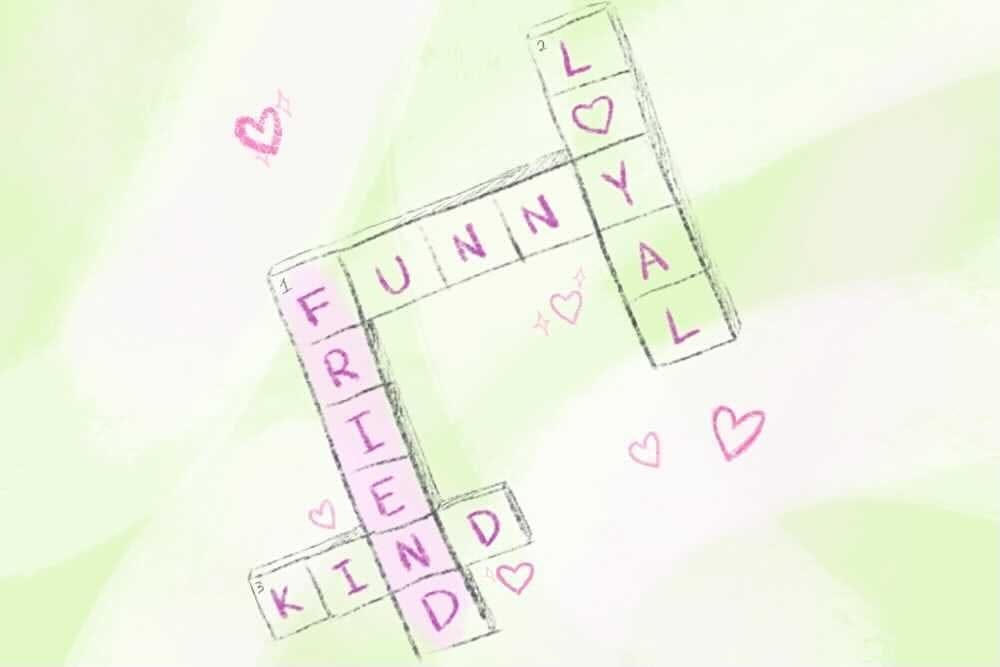In the year before life became real—that is, adult: exhilarating, pivotal, awful—I finished a crossword.
I bought a book for myself and my older sister: Best of The New York Times Crossword, edited by Will Shortz, with puzzles selected from 2010–11. At school, I used The Wall Street Journal crosswords site, which, unlike the New York Times, was free.
My partners rotated between my sister and a few of my friends. I mostly did crosswords with my best friend, turned boyfriend, turned ex–boyfriend, turned best friend again. I would ask a few other friends for answers on particular clues—football (before I started watching football), The Bachelor (I still don’t watch The Bachelor)—and occasionally, I would leave class to ask my freshman year English teacher for any answer I needed, though going to him was honestly more of a cheat than going to Google.
It took my best friend and me an hour to finish a Wall Street Journal Saturday crossword for the first time. When we finished, I emailed my former teacher, who was now teaching at a private school in New York, and received his congratulations.
And so ended my junior year of high school.
* * *
if i sign up for a nytimes crossword subscription and give you account name/password would you venmo me $10, I texted, an hour and 50 minutes before going on a spring break that would last a semester and a half.
My friend—an old high school friend, but not the ex–boyfriend/best friend—texted back, Yes?? N I would love u forever.
We weren’t expecting more than completing the early–in–the–week crosswords. I did the Monday. She did the Tuesday. I did the Wednesday. Current Streak: 3. She managed to finish the Thursday. Current Streak: 4. On Friday, the last night before she returned home from Princeton for a spring break that would last a semester and a half, we FaceTimed and extended our streak to five.
It was different from the junior year crosswords I offered in an attempt to repair a friendship broken by romance. After my friend and I discovered that we could do Fridays, then Saturdays, then Sundays, it became a routine. We alternate Mondays, Tuesdays, and Wednesdays. On Thursday nights, we FaceTime to do the Thursday and Friday. On Saturday nights, we FaceTime to do the Saturday and Sunday. Our times on those days are loosely doubled because we do them simultaneously on different devices rather than screen sharing, a carry–over from before Zoom’s ubiquity.
The twice–a–week calls keep us in contact through the demands of time and growing up.
“How are you doing?” “How are you feeling?” “What happened this week?” “Here are 20 minutes to three hours of my time that I have carved out for a crossword puzzle that never takes that long, which means that I have mostly carved it out for you.”
At Current Streak: 100, after the last finals of first year of college and the start of summer, my friend said, “You know, we can never lose this streak.”
In the brilliant fall that didn't come the way it was supposed to, I call my friend from a Harnwell apartment, and she calls me from a Princeton dorm. The fact that the fall was actually the worst in my life has little to do with the pandemic—or at least, little to do with the fact that I was stuck at home. I have a mid–life crisis, and I am not yet half–40. Being in Philadelphia would not have stopped the increasingly omnipresent burden of tomorrow.
Things get worse, as they often do. My Tuesdays are rough—my Wednesdays are worse. I text my friend an expression of frustration that mostly doesn’t make any sense, and she texts back. We call on Thursday. We call on Saturday. I text her a litany of fears or failures, and more where the two cross awkwardly: I think that it will be like this for at least the next three years. I think that the wrong things will stay the same and that the wrong things will change. I think that I will never be happy with what I have or ever will accomplish. I think that ultimately, the number will reset back to zero because that is how things go. I think that I just have to make it to Thursday, and then I will feel better.
My friend came to visit me once when I was a first–year, two months before spring break. We stood on the second floor of Shakespeare & Co., flipping through expensive poetry books with deckled edges, and my friend told me that her favorite poem was Mary Oliver’s “Wild Geese.”
The first line is “You do not have to be good.” Which is pretty much all you have to know.
* * *
Here is something I can count on: for our 300–day streak, we decided to do the crossword in person, as a celebration. I went to my friend’s house—specifically, her backyard. We wore masks and gloves. It was cold, and the wind was strong enough to blow out the faux fire log we lit in her fire pit. When I got home, I shook for 30 minutes despite crawling into bed and wrapping myself in blankets. For the next week, even after a negative test, I worried that my scratchy throat meant I had COVID–19. (It did not.).
But we hit 300, on the day after the new year began.
Current streak: 336







